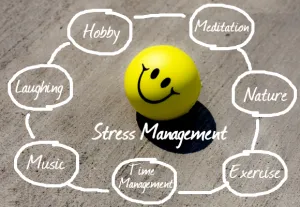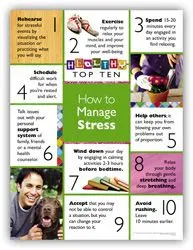How to manage stress
You may also feel scatterbrained, shift to a perpetual state of worry, feel unusually pessimistic and have a difficult time focusing and following through on your obligations. Emotionally, you may experience depressive feelings, including low self-esteem, worthlessness or loneliness. These issues can then be exacerbated by the fact that many people will have a desire to withdraw and avoid others when they’re feeling this way.

Keep a stress diary to identify the causes of short-term or frequent stress in your life. As you write down events, think about why this situation stresses you out. Also, use the Holmes and Rahe Stress Scale to identify specific events that could put you at risk of long-term stress.

Some people experience headaches or stomachaches, which occur when there’s too much stress-induced cortisol flowing through the body.Some people experience headaches or stomachaches, which occur when there’s too much stress-induced cortisol flowing through the body.
• Reach out. If you’re stressed out, talk to your friends and family. If you feel like you can’t handle the stress on your own, schedule an appointment with a counselor on campus.
Stress management starts with identifying the sources of stress in your life. This isn’t as straightforward as it sounds. While it’s easy to identify major stressors such as changing jobs, moving, or a going through a divorce, pinpointing the sources of chronic stress can be more complicated. It’s all too easy to overlook how your own thoughts, feelings, and behaviors contribute to your everyday stress levels. Sure, you may know that you’re constantly worried about work deadlines, but maybe it’s your procrastination, rather than the actual job demands, that is causing the stress.
PLEASE UPVOTE and RESTEEM for more tip and info steemit.com/@mathy007